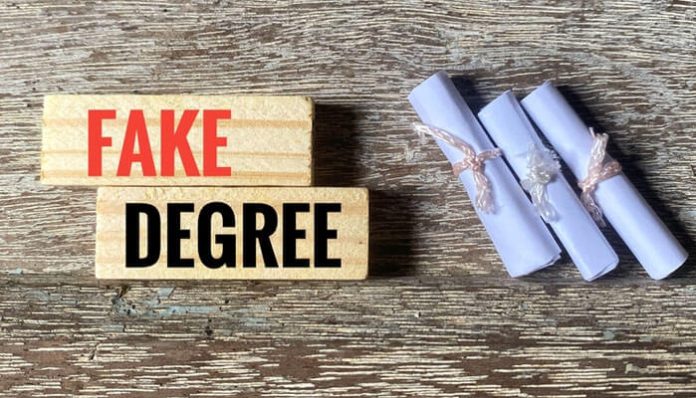Getting a fake degree sounds like a fun idea, and for some people, it can be their own way of having fun and enjoying life, as they prank others. But realistically, fake degrees are not something you want to play with. If you’re not careful, a fake diploma might even land you in legal trouble. That’s why you really have to be very careful when it comes to tackling this type of topic. Here’s also the type of mistakes people make when it comes to dealing with a fake degree.
Common mistakes people make with a fake degree.
They think companies don’t verify degrees
Some people think that if they use a fake degrees, they are good to go and no one will verify whether it’s real or not. That’s the thing, these days background checks have become a standard practice. Not only that, but more and more companies use digital verification tools. These specialize in finding the authenticity of a diploma, and that kind of stuff is extremely important.
There is a lot more scrutiny from platforms, too, especially LinkedIn. They don’t just accept a digital copy of the diploma, sometimes, they go to great lengths to ensure that the diploma is real. So yes, if you think about using a fake diploma, remember that companies verify degrees and there are a lot of background checks done, especially when it comes to the high tier positions
You use an obvious diploma mill
Depending on the diploma mill, they have different characteristics and a lot of verification tools know how to spot that. Also, some mills will use names that sound similar to real universities, the diploma lacks accreditation from real bodies, and stuff like that. Naturally, HR professionals are trained in this kind of stuff and they know how to identify fake mills. That’s why it has become more and more important to learn how to deal with these fake degrees effectively.
Choosing an unrealistic degree
For a lot of people, the thought behind getting a fake degree is that it will allow them to acquire better results in the things they do. But the truth is that if you assign yourself an unrealistic degree, that will bring a lot of red flags. For example, if you claim you have a PhD without any career trajectory to support that, it automatically raises red flags.
Also, you might be listing a degree from an institution that doesn’t even offer that program in the first place. Or you present advanced credentials in a field that has a lot of regulations to begin with. That’s the thing here, you want to be realistic when you present any degree. And if the degree is fake, verification professionals always go the extra mile to prove whether that degree is fake or not. And that alone can be incredibly important to keep in mind.
Document quality is low
Another way to spot fake diplomas is through the document quality. If you see misspelled words, the wrong logos, outdated seals, layouts, and fonts that do not match the institution or low paper quality, these are signs you might be dealing with a fake diploma. And that’s the thing, there are all kinds of signs that you need to look out for. A lot of the time, these are easy to spot, but there will be times when spotting those can prove to be inherently difficult, and that’s a thing you have to keep in mind.
Not taking into account digital footprints
A lot of people that want to use a fake diploma don’t realize that the digital footprint is always there. For example, sure, you get the fake degrees, but you don’t have any online presence or online network to highlight your presence there. The same thing is valid when it comes to faculty listings, but also you might be using a fake university that just disappears after a few months. Simple issues like this make it very easy to find inconsistencies and employers will know right away that you have a fake diploma.
Being way too confident during interviews
It might not seem like much, but realistically, most people don’t exude a ton of confidence during the interviews. It’s normal, because there is a lot of pressure and that alone can be stressful for most people. If you show too much confidence, then that will be seen as an issue.
Plus, when you are using a fake diploma, chances are that you will contradict yourself when it comes to the experience you have and the skills you can provide. That does happen when you just can’t back up the skills you claim in your resume due to the fake diploma. These are things you always have to think about, and in turn, it will only lead to you not being accepted in the first place.
You use a fake degree in a regulated profession
Regulated professions like aviation, law, engineering or healthcare rely a lot on accreditation and licensing. They will always check the validity of your credentials, perform background checks and so on. Basically, if you try to use a fake diploma in these niches, you will get caught pretty fast. But obviously, a lot of people that want to fake their knowledge and expertise think they can get away with it. Truth is, most of the time, they will not be able to do that.
Ignoring any long-term problems that arise
Yes, long term issues will always arise when you are trying to fake your degrees. For example, if they do realize that you had a fake degree, that will terminate your employment. On top of that, you could be dealing with public embarrassment if the case gets reported in the media, which obviously is possible to happen sometimes. And in some situations, the problem can be so challenging that you might even get blacklisted from the industry. Obviously, employers expect you to say the truth and not lie about your diplomas or degrees. But if you do that, you will be facing the consequences of your actions.
Underestimating any legal consequences
Yes, there can also be legal consequences related to the use of fake degrees. If you just think you can use a fake diploma and not deal with any repercussions, that’s an issue. There can be fines, or sometimes it can even lead to imprisonment. That’s aside from potential civil lawsuits and professional bans from the industry. Yes, not every company will search to see if you have a fake diploma or not. But most of them will, and if you get caught, that can have legal implications, which is something to keep in mind.
People still continue to use fake diplomas, mainly due to societal pressure, career desperation, misunderstanding or even trying to have a quick shortcut in life. No one has the patience to go through the process normally, so they will do everything in their power to try and get a degree that helps them move onward. That’s definitely a problem, if you rely on fake degrees to empower your career. Unfortunately, a lot of people do it, and they don’t take into account any of the consequences and potential issues that could arise!



